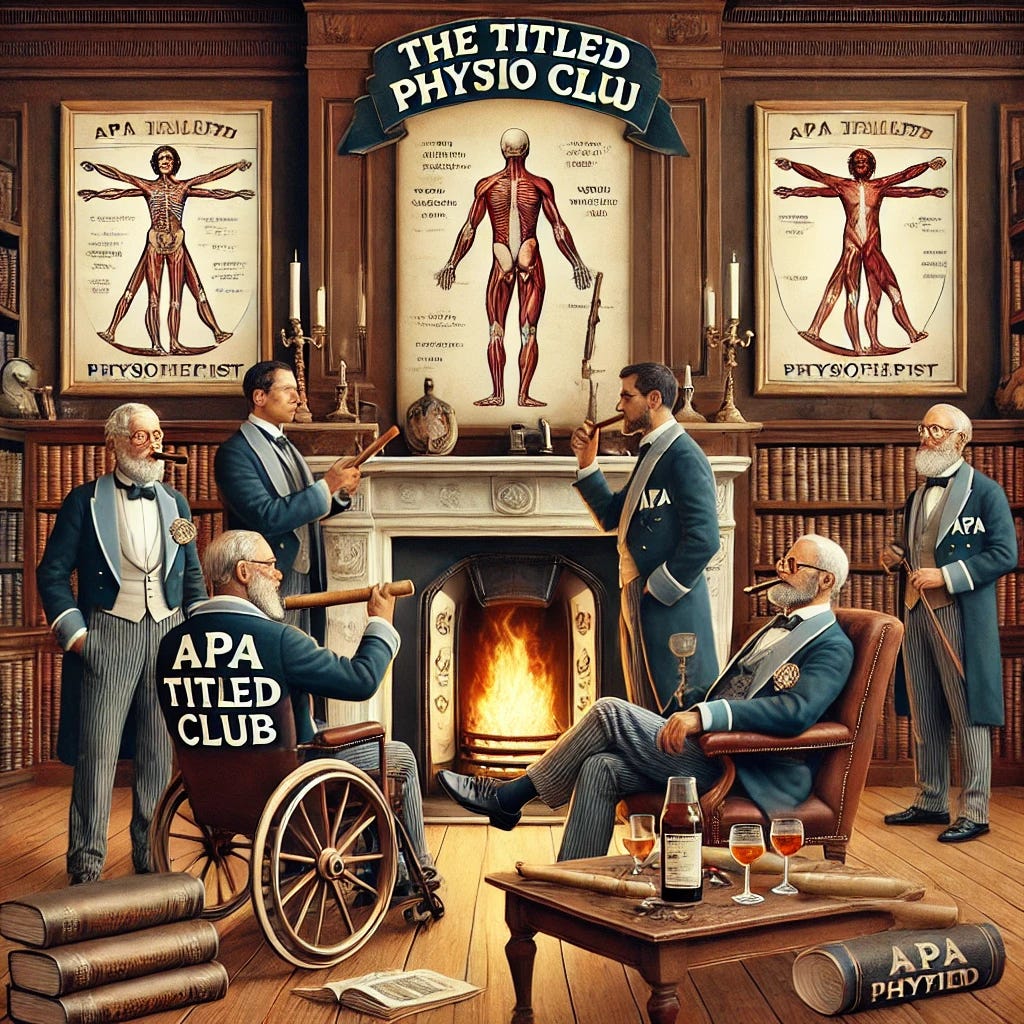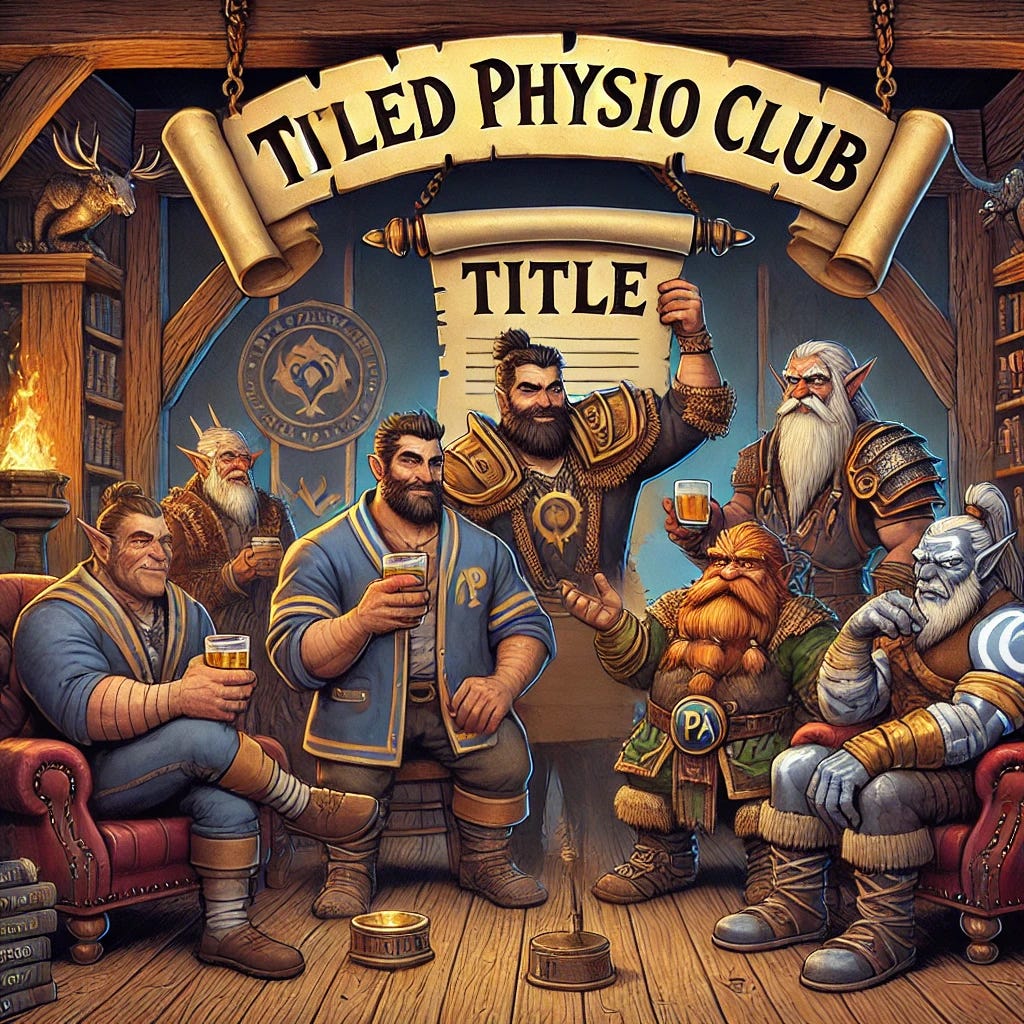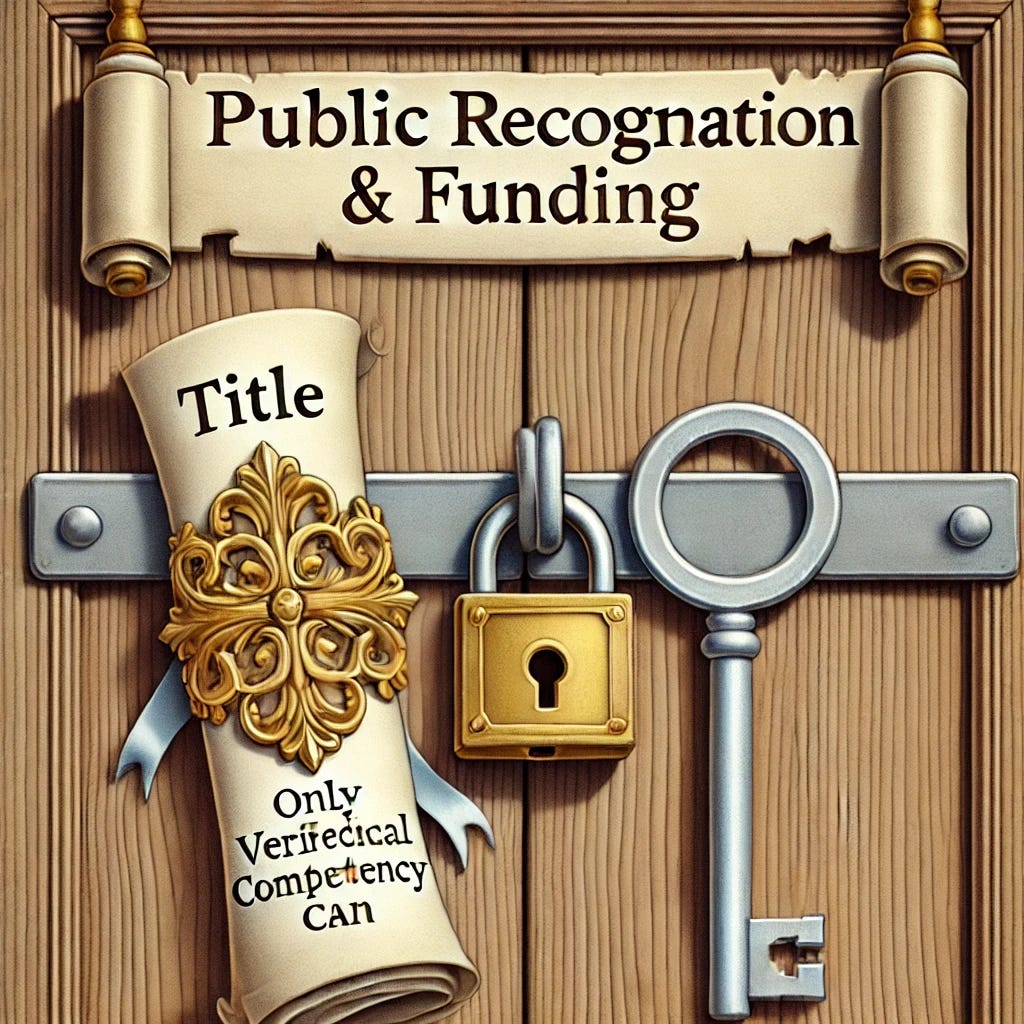Physio Manifesto II | Credentialing -The Title that Doesn’t Entitle
How we can make APA Titling meaningful and externally recognised.
This is a no-paywall blog post with insights I believe are valuable. If you find it useful, subscribe to my Substack for more in-depth content, exclusive case studies, and clinical insights.
Your support helps me continue sharing everything I’ve learned in the clinic with the world.
☕ Prefer a one-off thank you? Buy Me a Coffee.
This post is a guide only and should not be taken as medical advice. It does not replace assessment and recommendations from a registered and regulated healthcare professional.
Contents
🔹 Prologue - Cleaning the House, Selling the House, and Staying in It (🔗link)
🔹 Chapter I – Quality Control | “Are You Still Good?” Why competency checks matter, and how other professions do them better. (🔗link)
You are here👇
🔹 Chapter II – Credentialing | “The Title that Doesn’t Entitle” How we can make APA Titling meaningful and externally recognised. (🔗link)
🔹Chapter III – Branding | “What’s the Flavour?” Fixing the physio lucky-dip: labelling our services so patients know what they’re getting. (🔗link)
🔹 Chapter IV – Public Recognition | “The Public and the Public Purse” Why the public still doesn’t get us, and what happens when they do. (🔗link)
🔹 Chapter V – Retention | “Keep the Good Ones” How recognition, pay, and purpose drive the longevity of experienced clinicians. (🔗link)
🔹 Epilogue - Diplomacy Failed. This Is My Fart in the Wind. (🔗link)
Let’s talk about Titling.
It sounds official. It feels important. But in its current form?
It’s a badge without a key. A title without a door.
What Even Is a Title?
In physiotherapy, an “APA Title” (Australian Physiotherapy Association) usually means you’ve completed a postgraduate university degree or met the APA’s evidence portfolio requirements (experiential titling - unless you’re a Musculoskeletal Physiotherapist, there’s no experiential pathway for us).
You’re now allowed to use terms like:
APA Titled Sports & Exercise Physiotherapist
(absolutely not abbreviated to SEx Therapist but that’d be great)
APA Titled Musculoskeletal Physiotherapist
(absolutely not abbreviated to Musk… anything Musk related is particularly on the nose right now)
You get to put it on your business card.
You get to join the APA's “find a physio” list.
You get… internal recognition.
But what you don’t get is:
Higher pay (unless your patient is impressed enough to tip - or you coerce your employer to pay you more)
Better rebates from Medicare or insurers (external recognition)
Priority from referrers (external recognition)
Any formal acknowledgment of clinical superiority
Any regular check that you still meet the standard
It’s not a credential.
It’s a club.
What Did It Cost?
Titled Physios have often:
Completed a Masters degree (often $30–50K)
Taken 1–2 years out of full-time clinical work (or spread over a part-time study load)
Paid additional fees for APA membership and the titling process
That’s a huge investment. And for what?
Recognition… from other people in the club.
For patients, GPs, Medicare, or insurers?
It might as well be your level 80 Dwarven Hunter badge from World of Warcraft. No disrespect to Azeroth.
So Who Does It Actually Serve?
The APA promotes Titling as a mark of excellence — and in some cases, it is. For early-career physios wanting structured learning, or for landing roles in elite sport or research, it can open doors.
But for experienced, self-directed clinicians? Those already up to their elbows in real-world CPD, interdisciplinary networks, and trusted referral pathways?
It offers nothing new.
Worse — it's become a performance badge in an internal popularity contest. Titled physios are promised better marketing, more prestige, and recognition… but:
Medicare doesn’t care.
Private Health Insurers don’t care.
Referrers barely know what it means.
And the public definitely doesn’t.
You don’t get better rebates. You don’t get specialist rights. You don’t get the ability to refer for imaging or to orthopaedic surgeons. You do get the right to put more letters in front of your name and maybe high-5 another Titled Physio at a conference drinks cart.
Sure, if you’re looking for a stint at the very pointy end of elite sport in Australia (‘institute-level’, or the AFL, or NRL etc), you might need a ‘Title’ to open that door.
The APA needs Titling however. Without it, apart from rubbing shoulders with the Government (Advocacy), what else are they offering?
The APA risks becoming a self-licking ice cream cone — a membership body that exists primarily to sustain itself. Its core function has shifted from rubbing shoulder (pun intended) of polititions (aka ‘Advocacy’) and advancing standards, to ‘Advocacy’; and preserving structures that ensure continued membership revenue.
As explored in Chapter I, it promotes internal badges and titles as status symbols without the rigour of real clinical benchmarking. There’s no consistent, profession-wide quality control — after Titling there’s no annual competency checks, no minimum assessment standards, no peer-reviewed case reviews. Yet these titles are marketed as if they guarantee clinical excellence.
They don’t.
What they guarantee is continued APA membership.
Credentialing Needs More Than a Scroll
If we want to improve professional trust, increase rebates, and justify tiered recognition, we need:
External, independent competency checks
A structured tiering system based on clinical capability - not affordability of the next uni degree.
Titles that are earned, tested, and reviewed
Funding models that reward high-quality care
We’d better make Titling mean something
Because hot on our heels are the alternative therapies Titling themselves, such as ‘Titled Sports Chiropractors’. So we’d better make ours mean something before we get ‘Titled Sports Personal Trainers’ who’ll take a leaf out of the Chiro-book and called themselves Doctors:

As we’ll see in Chapter III: Branding - the public won’t know the difference - because “don’t physios, chiros, osteos and PTs all pretty much do the same thing”?
A Suggestion: Let Titling Become Credentialing
Sure, we could go down the Dietitians-Route and become Accredited Physiotherapists, it might look something like this:
Registration out of uni gets you practicing - registration to signify you won’t kill someone (hopefully), followed by 2 years of an ‘apprenticeship’.
Then after 2 years the Padawan Physio can begin the credentialling process.

But we don’t need to reinvent the wheel.
The APA Titling system is a very good starting point.
But it is simply lacking:
External validation by AHPRA and the Physiotherapy Board of Australia (PBA)
Ongoing re-assessment of clinical skills and CPD quality, by the PBA. You know, that whole Competency Check thing we talked about in Chapter I.
Links to public funding models (Medicare, PHIs, government roles)
Only then will patients, policymakers, and the profession take it seriously.
Until then?
A Title is a scroll. It might open some doors.
But Competency is key, and it will unlock the doors that matter.
Coming next: Chapter III – Branding | “What’s the Flavour?” Fixing the physio lucky-dip: labelling our services so patients know what they’re getting. (🔗link)
Did this challenge your thinking or add value to your patient care? If so, even a small contribution helps me keep content like this going.
If this post helped you rethink an approach, refine a diagnosis, or improve patient outcomes, consider supporting my work.
☕ Buy Me a Coffee to say thanks, or become a paid subscriber—healthcare providers who subscribe can share cases with me or ask clinical questions anytime.
Tailor your Nick Ilic | Physio Clinician subscription:
You can customise which topics you receive updates for by selecting 'Manage Subscription' in your Substack options (in your browser), or by clicking 'unsubscribe' at the bottom of any email—don’t worry, it won’t unsubscribe you immediately! You'll then be able to choose your preferred sections:
✅ Patient Playbook
✅ Clinician’s Corner
✅ Research Reviews
✅ Clinician’s Compass
Choose what suits you best—I promise I won’t take it personally!













